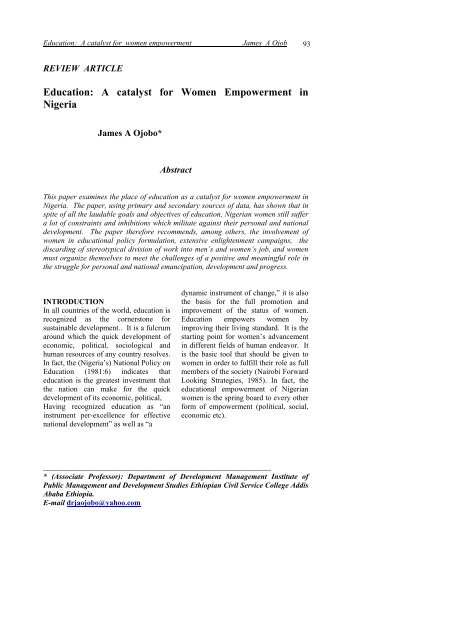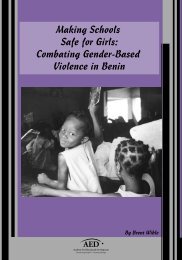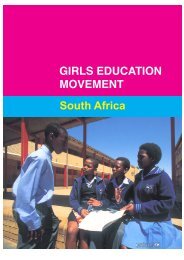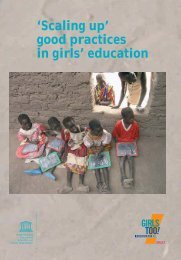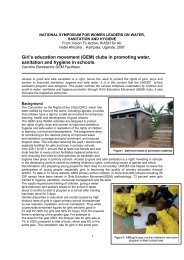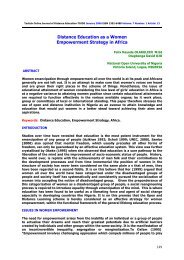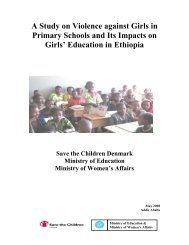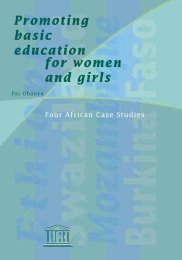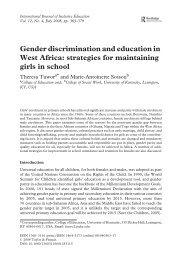Education: A catalyst for women empowerment - African Journals ...
Education: A catalyst for women empowerment - African Journals ...
Education: A catalyst for women empowerment - African Journals ...
You also want an ePaper? Increase the reach of your titles
YUMPU automatically turns print PDFs into web optimized ePapers that Google loves.
<strong>Education</strong>: A <strong>catalyst</strong> <strong>for</strong> <strong>women</strong> <strong>empowerment</strong> James A Ojob 93<br />
REVIEW ARTICLE<br />
<strong>Education</strong>: A <strong>catalyst</strong> <strong>for</strong> Women Empowerment in<br />
Nigeria<br />
James A Ojobo*<br />
Abstract<br />
This paper examines the place of education as a <strong>catalyst</strong> <strong>for</strong> <strong>women</strong> <strong>empowerment</strong> in<br />
Nigeria. The paper, using primary and secondary sources of data, has shown that in<br />
spite of all the laudable goals and objectives of education, Nigerian <strong>women</strong> still suffer<br />
a lot of constraints and inhibitions which militate against their personal and national<br />
development. The paper there<strong>for</strong>e recommends, among others, the involvement of<br />
<strong>women</strong> in educational policy <strong>for</strong>mulation, extensive enlightenment campaigns, the<br />
discarding of stereotypical division of work into men’s and <strong>women</strong>’s job, and <strong>women</strong><br />
must organize themselves to meet the challenges of a positive and meaningful role in<br />
the struggle <strong>for</strong> personal and national emancipation, development and progress.<br />
INTRODUCTION<br />
In all countries of the world, education is<br />
recognized as the cornerstone <strong>for</strong><br />
sustainable development.. It is a fulcrum<br />
around which the quick development of<br />
economic, political, sociological and<br />
human resources of any country resolves.<br />
In fact, the (Nigeria’s) National Policy on<br />
<strong>Education</strong> (1981:6) indicates that<br />
education is the greatest investment that<br />
the nation can make <strong>for</strong> the quick<br />
development of its economic, political,<br />
Having recognized education as “an<br />
instrument per-excellence <strong>for</strong> effective<br />
national development” as well as “a<br />
dynamic instrument of change,” it is also<br />
the basis <strong>for</strong> the full promotion and<br />
improvement of the status of <strong>women</strong>.<br />
<strong>Education</strong> empowers <strong>women</strong> by<br />
improving their living standard. It is the<br />
starting point <strong>for</strong> <strong>women</strong>’s advancement<br />
in different fields of human endeavor. It<br />
is the basic tool that should be given to<br />
<strong>women</strong> in order to fulfill their role as full<br />
members of the society (Nairobi Forward<br />
Looking Strategies, 1985). In fact, the<br />
educational <strong>empowerment</strong> of Nigerian<br />
<strong>women</strong> is the spring board to every other<br />
<strong>for</strong>m of <strong>empowerment</strong> (political, social,<br />
economic etc).<br />
____________________________________________________________<br />
* (Associate Professor): Department of Development Management Institute of<br />
Public Management and Development Studies Ethiopian Civil Service College Addis<br />
Ababa Ethiopia.<br />
E-mail drjaojobo@yahoo.com
Ethiop. J. Educ. & Sc. vol. 4 No. 1 September, 2008 94<br />
As citizens of this great nation who <strong>for</strong>m<br />
a great percentage of the population,<br />
<strong>women</strong> in Nigeria are expected to<br />
contribute their quota to the development<br />
of their country. For individual and<br />
national development, it is crucial that<br />
girls and female adults should acquire or<br />
have <strong>for</strong>mal education. Un<strong>for</strong>tunately, a<br />
cursory look at the pattern of <strong>women</strong>’s<br />
involvement in education in Nigeria<br />
reveals abysmal low levels. In spite of<br />
all the laudable goals and objectives of<br />
education, Nigerian <strong>women</strong> still suffer a<br />
lot of constraints and inhibitions which<br />
militate against their personal and<br />
national development. As much as 61%<br />
of the Nigerian Women’s 44 million<br />
population (1991 Census) suffer from<br />
intellectual poverty (Ojuolape, 2000).<br />
Early history of education in Nigeria<br />
showed that <strong>women</strong> lacked easy access to<br />
<strong>for</strong>mal education. By 1965, 37.7% of<br />
pupils in primary schools were girls<br />
while only 9% of under-graduates were<br />
female students (Sanni, 2001). The<br />
figure rose to 25.5% by 1974 and the<br />
students were mainly enrolled in such<br />
courses as teaching and the Social<br />
Sciences. The available figures indicate<br />
that the total full time enrolment of<br />
females in the University stood at 50,652<br />
as against male population of 138,334 in<br />
1992 (Federal Office of Statistics, Abuja,<br />
1994).<br />
It is also remarkable and significant to<br />
note that the early educational curriculum<br />
was designed to train <strong>women</strong> as teachers,<br />
nurses, and clerks. They were not in<br />
medicine, politics, engineering, law and<br />
environmental studies (Achume, 2004).<br />
This obviously resulted in shortage of<br />
qualified <strong>women</strong> <strong>for</strong> top level leadership<br />
posts. In other words, majority of<br />
<strong>women</strong>/females are still not being trained<br />
and employed in areas that will enhance<br />
their chances at competing <strong>for</strong> position in<br />
public life. As can be expected, this low<br />
level of female education worsens the<br />
imbalance of power that has been<br />
existing between the sexes. One of the<br />
legacies of this is the absence of the<br />
female equivalence of the male political<br />
class.<br />
The plight of <strong>women</strong>’s education in<br />
Nigeria is such that provisions <strong>for</strong><br />
improving <strong>women</strong>’s participation had to<br />
be made in the Nigerian National Policy<br />
on <strong>Education</strong>. Section 3, paragraph 11 of<br />
the national policy states thus:<br />
With regard to <strong>women</strong>’s<br />
education, special ef<strong>for</strong>ts will<br />
be made by Ministries of<br />
<strong>Education</strong> and Local<br />
Government Authorities in<br />
conjunction with Ministries of<br />
Community Development and<br />
Social Welfare and<br />
in<strong>for</strong>mation to encourage<br />
parents to send their<br />
daughters to school.<br />
The Nigerian Government had taken<br />
several practical steps to improve<br />
<strong>women</strong>’s participation in education by<br />
establishing a full-fledged Women’s<br />
<strong>Education</strong> Section under the Federal<br />
Ministry of <strong>Education</strong> in 1986. It has<br />
been well observed by Alao and Ajayi<br />
(1989:8) that after more than twenty years<br />
of the existence of the Women’s<br />
<strong>Education</strong> Section in the Federal Ministry<br />
of <strong>Education</strong>, <strong>women</strong>’s education is still<br />
in dire need of improvement. It is this<br />
paradox that has <strong>for</strong>med the purview of<br />
this paper.<br />
This paper, there<strong>for</strong>e, seeks to achieve<br />
the following objectives:<br />
(a) To argue <strong>for</strong> the introduction and<br />
nurturing of educational programmes<br />
which will galvanize the<br />
<strong>empowerment</strong> of <strong>women</strong> of all<br />
categories in Nigeria, irrespective of<br />
creed or religious beliefs and cultural<br />
inclination?<br />
(b) To highlight the factors inhibiting<br />
<strong>women</strong>’s education which have<br />
contributed significantly towards
<strong>Education</strong>: A <strong>catalyst</strong> <strong>for</strong> <strong>women</strong> <strong>empowerment</strong> James A Ojob 95<br />
female mass illiteracy in Nigeria;<br />
and<br />
(c) To proffer suggestions <strong>for</strong> the<br />
establishment and running of<br />
educational programmes <strong>for</strong> the<br />
Nigerian <strong>women</strong> which would<br />
definitely lift them up from the abyss<br />
of ignorance, poverty, total<br />
dependency on spouses, inferiority<br />
complex, lack of self confidence and<br />
depression etc.<br />
2. METHODOLOGY<br />
A descriptive survey method was<br />
employed in order to investigate the role<br />
of education as a <strong>catalyst</strong> <strong>for</strong> <strong>women</strong><br />
<strong>empowerment</strong> in Nigeria. The data was<br />
generated through interview and<br />
documentary analysis. Interview was<br />
conducted with officials from the Federal<br />
and State Ministries of <strong>Education</strong>. The<br />
researchers is also a senior member of<br />
academic staff in Nigeria and now in<br />
Ethiopia. In addition to this source of<br />
data, documents and previous studies on<br />
education and <strong>women</strong> <strong>empowerment</strong><br />
were reviewed. The research, there<strong>for</strong>e,<br />
relied, in addition to the primary sources,<br />
on secondary sources of data which<br />
include journals, textbooks, seminar<br />
papers, magazines, bulletins, newspapers,<br />
and periodicals. A qualitative data<br />
analysis technique was employed in<br />
order to analyze the responses from the<br />
unstructured interview and related<br />
documents. conclusions in this study<br />
were arrived at using analysis of the<br />
existing data and responses from the<br />
interviewees.<br />
3. Literature Review and Theoretical<br />
Framework<br />
3.1. Empirical Literature<br />
This section clarifies the concept of<br />
education and <strong>women</strong> <strong>empowerment</strong>. It<br />
also examines the gap between the<br />
literacy level of male gender and that of<br />
the female gender. The benefits <strong>women</strong><br />
derive from educational ventures and<br />
constraints inhibiting <strong>women</strong>’s education<br />
in Nigeria are also dealt with in this<br />
section.<br />
(a) <strong>Education</strong>: Oka<strong>for</strong> (1984) defines<br />
education as a process of acculturation<br />
through which the individual is helped to<br />
attain the development of all his<br />
potentialities and their maximum<br />
activation when necessary, according to<br />
right reason and thereby achieve his<br />
perfect self-fulfillment. <strong>Education</strong> is the<br />
aggregate of all the processes by which a<br />
child or young adult (male of female)<br />
develops the abilities, attitudes and other<br />
<strong>for</strong>ms of behavior which are of positive<br />
value to the society in which he/she lives.<br />
It is a process through which a person<br />
acquires knowledge, skills, habits and<br />
values that enables him to function<br />
effectively as a member of the society.<br />
<strong>Education</strong> helps one to maximize his<br />
physical, mental and emotional<br />
capabilities which are useful <strong>for</strong> him and<br />
his society. In this sense, <strong>women</strong><br />
education means the process by which<br />
<strong>women</strong> acquire the knowledge, skills,<br />
norms and values that are necessary <strong>for</strong><br />
their development and that of the society.<br />
(b) Women Empowerment: Perhaps<br />
there are as many definitions of <strong>women</strong><br />
<strong>empowerment</strong> as are authors’<br />
<strong>empowerment</strong>. Sako (1999:32) defines<br />
<strong>empowerment</strong> as:<br />
The process of strengthening<br />
the existing capacities and<br />
capabilities of disadvantaged<br />
groups in society so as to<br />
enable them per<strong>for</strong>m towards<br />
improving themselves, their<br />
families and the society as a<br />
whole. It involves the<br />
provision of enabling<br />
environment <strong>for</strong> their<br />
productive and intellectual<br />
abilities to be realized. In<br />
some societies where some<br />
groups have suffered<br />
discrimination <strong>for</strong> a long time,<br />
ways have been found to<br />
address this problem. Laws
Ethiop. J. Educ. & Sc. vol. 4 No. 1 September, 2008 96<br />
have been made to protect<br />
these groups against future<br />
discrimination with the goal of<br />
providing equal opportunities<br />
<strong>for</strong> all.<br />
Fadeiye and Olanegan<br />
(2001:66) viewed<br />
<strong>women</strong> <strong>empowerment</strong><br />
as:<br />
A process of enabling <strong>women</strong> to develop<br />
the capacity to actualize their potentials.<br />
…That <strong>women</strong> should be looked at as<br />
individuals that possess some hidden<br />
potentials <strong>for</strong> greatness and so should be<br />
encouraged to develop such to the fullest.<br />
Enemuo (1999:233),<br />
quoting Sandbrook and<br />
Halfani, viewed<br />
<strong>empowerment</strong> as: a<br />
multi-dimensional process<br />
involving the trans<strong>for</strong>mation<br />
of the economic, social,<br />
psychological, political and<br />
legal circumstances of the<br />
powerless. In the specific case<br />
of <strong>women</strong>, <strong>empowerment</strong><br />
entails not only positive<br />
changes in these critical<br />
respects but also the<br />
dismantling of the cultural<br />
norms and traditional<br />
practices that devalue,<br />
disempower and dispossess<br />
<strong>women</strong>. The process must<br />
necessarily also include the<br />
expansion of <strong>women</strong>’s access<br />
to educational opportunities,<br />
facilities <strong>for</strong> skills acquisition<br />
and positions of authority.<br />
For the purpose of this study, it is a<br />
multi-dimensional process involving the<br />
trans<strong>for</strong>mation of the economic, social<br />
psychological, political and legal<br />
circumstances of the powerless. In the<br />
specific case of <strong>women</strong>, <strong>empowerment</strong><br />
entails not only positive changes in these<br />
critical respects but also the dismantling<br />
of the cultural norms and traditional<br />
practices that devalue, dis-empower and<br />
dispossess <strong>women</strong>. It means giving<br />
traditional and legal status to the ef<strong>for</strong>ts<br />
of <strong>women</strong> to develop and contribute to<br />
the creation of wealth, taking and<br />
participating in decision making of their<br />
families and societies at large and to<br />
reduce their present state of vulnerability,<br />
decrease dependency and passivity and be<br />
at the centre, not at the periphery.<br />
3.2.Contributions of Educated Women in<br />
National Development<br />
The benefits derivable from education<br />
include the following: enhancement of<br />
the quality of living-food, housing,<br />
health, clothing, transport,<br />
communication, entertainment and<br />
gainful use of leisure. If the vast<br />
majority of our <strong>women</strong> folk are educated,<br />
their personal development can be<br />
enhanced remarkably. Children and<br />
husbands also stand to gain<br />
tremendously. Women are likely to have<br />
more confidence in themselves and their<br />
ability to contribute effectively to<br />
national development.<br />
Marital Obligation: <strong>Education</strong> helps in<br />
the fulfillment of <strong>women</strong>’s obligation. A<br />
married woman is expected to take care<br />
of her home – husband and children. She<br />
is expected to use whatever knowledge<br />
and skills she has to cook, clean and rear<br />
her children – there is no doubt that a<br />
woman who is able to read about health<br />
care, nutrition, body changes, modern<br />
household equipment, etc, will per<strong>for</strong>m<br />
creditably well her God-given<br />
responsibility to the home and society at<br />
large.<br />
An educated woman will be able to help<br />
her children with their school<br />
assignments. She may also go beyond<br />
that to further enlighten them in their<br />
school work, attend Parents Teachers<br />
Association (PTA) meetings and inquire<br />
about the academic per<strong>for</strong>mances of her<br />
children.
<strong>Education</strong>: A <strong>catalyst</strong> <strong>for</strong> <strong>women</strong> <strong>empowerment</strong> James A Ojob 97<br />
This will ensure blissful homes, welleducated<br />
and well-behaved children and<br />
contented husbands and an endowed<br />
nation.<br />
Agricultural Development: Half of the<br />
world’s populations are <strong>women</strong> and twothird<br />
of the work is done by them. About<br />
75 percent of agricultural output in<br />
Africa is produced through <strong>women</strong>’s<br />
ef<strong>for</strong>ts (Adeyeye, 1987). Ironically the<br />
people that participate most in<br />
agricultural production are the least<br />
educated. There<strong>for</strong>e, provision of basic<br />
literacy and skill acquisition <strong>for</strong> illiterate<br />
females will no doubt ensure bumper<br />
agricultural production.<br />
Health: Mothers help in no small<br />
measure in securing perfect health <strong>for</strong> the<br />
children and by so doing <strong>for</strong> the entire<br />
community and nation. Attaining good<br />
health starts right from the womb. It<br />
starts from the pregnant mother knowing<br />
and taking what constitute balanced diet,<br />
abstaining from damaging drugs, and<br />
actions inimical to the health of the baby.<br />
A woman can beware of all these<br />
harmful conditions if she is educated,<br />
since most enlightenment campaigns<br />
against diseases are transmitted either<br />
through the radio, television, newspapers,<br />
posters, pamphlets or magazines or in the<br />
local languages or English language. If<br />
<strong>women</strong> are educated they will have<br />
knowledge of basic health care and will<br />
be in a position to help others to maintain<br />
and improve their own health.<br />
National Reconstruction: If <strong>women</strong> are<br />
educated, they will be able to assist in<br />
nation building and reconstruction. A<br />
few <strong>women</strong> are currently holding<br />
powerful positions in our country and in<br />
the world. There is still room <strong>for</strong><br />
improvement if more <strong>women</strong> are<br />
educated. Perhaps with more <strong>women</strong><br />
holding the mantle in a male-dominated<br />
political arena, the socio-political state of<br />
affairs, the world over, will definitely<br />
improve.<br />
Social Development: The improvement<br />
of society could be effected through the<br />
development of the potentialities of the<br />
<strong>women</strong> folk. The 1978 General<br />
Conference of UNESCO meeting said:<br />
Increasing educational<br />
opportunities <strong>for</strong> <strong>women</strong><br />
boosts equity and foster<br />
national development. The<br />
potential contribution of<br />
educated and trained <strong>women</strong><br />
to labour <strong>for</strong>ce and the<br />
importance of their education<br />
in the improvement of family<br />
welfare and planning are<br />
factors still under-estimated in<br />
national development.<br />
It is also pertinent to mention here that<br />
the higher the level of education, the<br />
greater the likelihood that a <strong>women</strong> will<br />
stay in the labour <strong>for</strong>ce. The<br />
participation of <strong>women</strong> with university<br />
degrees is more than double that of<br />
<strong>women</strong> who have only primary<br />
education. This creates an everincreasing<br />
pool of experienced and<br />
skilled personnel and from which<br />
supervisory and management positions<br />
can be filled.<br />
Economic Development: In the<br />
economic sphere, most <strong>women</strong> engage in<br />
small scale or large scale businesses.<br />
Also, <strong>women</strong> who are married to<br />
entrepreneurs and big time businessmen<br />
will be able to help such husbands if<br />
educated; they will be able to converse<br />
with such husbands intelligently and<br />
offer useful advice to them concerning<br />
their jobs. Such <strong>women</strong> will be able to<br />
deal with their husbands’ business<br />
partners, friends and other highly placed<br />
associates without the slightest feeling of<br />
inferiority or shame. Furthermore, if<br />
<strong>women</strong> are educated and are gainfully<br />
employed, they can assist their husbands<br />
in financing the home and the education<br />
of their children.
Ethiop. J. Educ. & Sc. vol. 4 No. 1 September, 2008 98<br />
3.4. Theoretical Framework of<br />
Analysis.<br />
This study is anchored on the systems<br />
theory. In its simplest sense, “systems”<br />
has been defined as a set of assemblage<br />
of things connected, or inter-dependent,<br />
so as to <strong>for</strong>m a complete unity, a whole<br />
composed of parts in orderly<br />
management according to some scheme<br />
or plan. In a more pragmatic sense, it is<br />
“any combination of human and material<br />
resources, including the organization and<br />
procedures required to coordinate their<br />
functioning employed to achieve a<br />
mission or objective.<br />
A system usually has many attributes,<br />
which can be summarized thus:<br />
(a) A system can be perceived as a<br />
whole with parts and their inter -<br />
dependent relationship;<br />
Fig. 1<br />
Systems Theory<br />
(b) Systems have subsystems and are<br />
also part of a supra system, a system<br />
can be regarded as either open or<br />
closed. A system is regarded as<br />
open if it exchanges in<strong>for</strong>mation,<br />
energy or material with its<br />
environment, as happens with<br />
biological or social (like a company)<br />
systems; it is regarded as closed if it<br />
does not have such interactions with<br />
the environment.<br />
(c) A system interacts with its<br />
environment in terms of a process<br />
that involves inputs, conversion, and<br />
output of energy, in<strong>for</strong>mation and<br />
materials.<br />
(d) A system tends to re-energize or<br />
modify itself through the process of<br />
in<strong>for</strong>mation feedback from the<br />
environment as illustrated in the<br />
Figure 1 below:<br />
Re-entering the system<br />
Inputs – Trans<strong>for</strong>mation – Output<br />
External Environment<br />
Source: Harold Koontz et al., Management, McGraw Hill<br />
International Book Coy; 1980, P. 24.<br />
The justification <strong>for</strong> using the systems<br />
theory is premised on the fact that<br />
Nigeria (the whole) is made up of male<br />
and female population (parts). If<br />
education is accepted as a dynamic<br />
instrument <strong>for</strong> change and an instrument<br />
per excellence <strong>for</strong> effecting national<br />
development, then both gender (male and<br />
female) must be given equal educational<br />
opportunities.<br />
4. Results and Discussion<br />
4.1. The Literacy Gap between the<br />
Male Gender and Female Gender in<br />
Nigeria<br />
Having established the importance of<br />
education in national development, it is<br />
apposite to maintain that the girl-child or<br />
the female gender has been dastardly<br />
affected. Within the literacy limit, the<br />
literacy level of boys or the male gender<br />
far exceeds that of the female gender.<br />
Since the female gender metamorphoses<br />
into the <strong>women</strong> folk, the literacy level<br />
among Nigerian <strong>women</strong> has been very<br />
low compared to that of men. Nigeria<br />
<strong>women</strong> occupy very low educational<br />
status compared with their male<br />
counterparts. According to Singh et al<br />
(1992) about 70% of the adult female<br />
population is illiterate. This is compared<br />
to adult male illiteracy of 46%. Despite<br />
ef<strong>for</strong>ts at increasing the supply of female<br />
education through massive campaign,<br />
building of more schools, subsidies <strong>for</strong><br />
female pupils etc, the demand <strong>for</strong> female
<strong>Education</strong>: A <strong>catalyst</strong> <strong>for</strong> <strong>women</strong> <strong>empowerment</strong> James A Ojob 99<br />
education is still very low (Odili et al,<br />
2000). Gender disparity (with girls and<br />
<strong>women</strong> as the disadvantaged) is a wellknown<br />
feature of Nigeria’s educational<br />
landscape. This has often been<br />
compounded by geographical and social<br />
disparities, with the disadvantaged states<br />
and the socially disadvantaged groups in<br />
the population bearing a heavier burden<br />
of gender inequality (<strong>Education</strong> Today,<br />
2000).<br />
In the Nigerian setting, the<br />
circumstances of gender have strongly<br />
interacted with culture to produce sex<br />
role, stereotypes and demands which<br />
have enormously influenced the attitudes<br />
of males and females to many issues<br />
including Science, Technology and<br />
Mathematics (STM) education.<br />
Onyemelukwe (1995) reported that sex<br />
difference in the per<strong>for</strong>mance of students<br />
(boys and girls) in some school subjects<br />
could be attributed to a variety of factors<br />
such as gender and attitude. In view of<br />
the above, Okeke (1990) identified some<br />
obstacles encountered by female in<br />
education to include the followings:<br />
Lack of support from educational policy<br />
makers,<br />
(a) Differential socialization patterns <strong>for</strong><br />
boys and girls at early stages of life,<br />
(b) Limited access to education of girls,<br />
(c) Sex differences in the quality of<br />
education experiences <strong>for</strong> boys and<br />
girls,<br />
(d) Perceived irrelevance of school <strong>for</strong><br />
girls,<br />
(e) Absence of career education; and<br />
(f) Masculine image of education.<br />
While males and females have been<br />
theoretically af<strong>for</strong>ded equal access to<br />
education, traditional social attributes<br />
about the appropriateness of education<br />
<strong>for</strong> young Nigerian <strong>women</strong> are not apt to<br />
change so rapidly towards social equality<br />
of the sexes. In general, girls and <strong>women</strong><br />
have made steady progress in all areas of<br />
<strong>for</strong>mal education in Nigeria since<br />
independence in 1960, enrollment rates<br />
have risen at all levels of education,<br />
drop-out rates have fallen while the<br />
government continues to make constant<br />
ef<strong>for</strong>ts to improve the quality of<br />
education that is received. Female<br />
education, however, still lags behind that<br />
of males in many respects. For instance,<br />
female enrolment rates at all the levels of<br />
<strong>for</strong>mal education remain below those of<br />
male; girls have a higher drop-out rate;<br />
girls are much fewer in the important<br />
subject areas of science, technology and<br />
mathematics, and their career choice is<br />
still largely confined to the ‘feminine’<br />
areas of teaching, nursing, secretarial<br />
studies, catering, etc.<br />
As Nigeria pursues and prosecutes the<br />
lofty goal of educational advancement in<br />
the millennium, findings reveals that<br />
gender inequality still characterized the<br />
educational advancement of the country.<br />
From primary school level to the<br />
university, gender inequality subsists as<br />
more males are admitted to the tertiary<br />
educational level than females. A brief<br />
examination of developments in each of<br />
the sub-levels of <strong>for</strong>mal education will<br />
illustrate the situation.
Ethiop. J. Educ. & Sc. vol. 4 No. 1 September, 2008 100<br />
Table 1: Primary School Enrolment Nigeria by Sex (1960-1995)<br />
Year Total Male % Female %<br />
1960 2,912,618 1,829,471 52.81 1,083,147 37.1<br />
1965 2,911,742 1,791,563 61.5 1,120,179 38.5<br />
1970 3,515,598 2,216,000 63.2 1,299,598 37.0<br />
1975 6,165,547 3,540,486 57.4 2,625,061 42.6<br />
1980 13,760,030 7,789,786 56.4 5,970,244 43.4<br />
1985 12,914,870 7,182,552 55.6 5,732,318 44.2<br />
1990 13,007,249 7,729,677 56.8 5,877,572 43.8<br />
1991 13,776,854 7,741,897 56.2 6,034,957 43.8<br />
1992 14,805,937 8,273,824 55.9 6,532,113 44.1<br />
1993 15,870,280 8,930,600 56.3 6,939,680 43.7<br />
1994 16,190,947 9,056,947 55.9 7,134,582 44.1<br />
1995 15,741,078 8,729,421 55.5 7,134,682 44.5<br />
Source: Statistics Branch, Federal Ministry of <strong>Education</strong>, Abuja<br />
Table 2: Secondary School Enrollment in Nigeria by Sex 1990-1995<br />
1990 1991 1992 1993 1994 1995<br />
Total 2,901,993 3,123,227 3,600,620 4,032,083 4,451,329 4,448,991<br />
Enrollment<br />
Total 1,661,468 1,821,307 1,979,045 2,182,034 2,419,782 2,354,713<br />
males<br />
Enrolment (57.25%) (58.31%) (54.0%) (54.0%) (54.0%) (52.9%)<br />
Total 1,240,525 1,301,970 1,621,575 1,850.049 2,031,547 2,094,279<br />
female<br />
Enrolment (42.75%) (41.69%) (46.0%) (46.0%) (46.0%) (47.1%)<br />
Source: Statistics Branch, Federal Ministry of <strong>Education</strong>, Abuja<br />
Table 3: Number of Male – Female in Nigerian Universities by Faculty 1986/87<br />
Academic Year<br />
Faculty Male Female Total % Female<br />
Administration 7492 1373 8869 15.47<br />
Agriculture 7469 1618 9087 17.81<br />
Arts 13543 6712 20255 33.14<br />
Earth and Mining Sciences 495 66 564 11.71<br />
<strong>Education</strong> 17419 10759 28178 37.18<br />
Engineering Technology 11708 847 12555 6.75<br />
Environment Design 4693 678 5371 12.62<br />
Law 6955 2136 9691 23.50<br />
Medicine / Health Sciences 7423 2433 9856 24.69<br />
Pharmacy 1398 597 1995 29.92<br />
Social Sciences 14046 3342 18288 18.27<br />
Natural Sciences 15785 5414 21199 25.54<br />
Veterinary Medicine 1144 148 1292 11.46<br />
Basic / Remedial Studies 3167 846 4013 21.08<br />
Total 113645 36968 150613 24.55<br />
Source: National University Commission annual Report, Abuja (1987, P. 27).
<strong>Education</strong>: A <strong>catalyst</strong> <strong>for</strong> <strong>women</strong> <strong>empowerment</strong> James A Ojob 101<br />
Year Table 4: Number of Male-Female in Nigerian Universities by Faculty<br />
(2003/2004) Academic Year.<br />
Faculty Male Female % female<br />
Admin/Management Sciences 56217 28551 33.68<br />
Agriculture 27755 12152 30.45<br />
Arts 48946 25214 33.99<br />
<strong>Education</strong> 64739 33992 34.42<br />
Engineering / Technology 48332 12607 20.68<br />
Environmental Science 22813 6922 23.27<br />
Law 20949 12097 36.60<br />
Medicine 27198 14791 35.22<br />
Pharmacy 4150 2067 33.24<br />
Science 92065 44606 48.45<br />
Social Science 72133 36387 33.53<br />
Veterinary Medicine 2517 695 21.03<br />
Dentistry 1560 840 35.00<br />
Source: National University Commission Data Bank, Abuja.<br />
Table 5: Undergraduate Enrolment in Nigerian Universities (2000 – 2005<br />
Academic Years)<br />
Year Male Female Total % Female<br />
2000 – 2001 231633 127125 358758 35.43<br />
2001 – 2002 274131 170818 444949 38.39<br />
2002 – 2003 373778 232326 606194 38.37<br />
2003 – 2004 489276 231117 720393 32.08<br />
2004 – 2005 466159 258697 724856 35.68<br />
Source: National University Commission Data Bank, Abuja<br />
Table 6: Total Enrolment Male – Female by University Status (2003 – 2004<br />
Academic Year<br />
University Male Female Total % Female<br />
Federal 342833 151437 493270 30.49<br />
State 132889 69882 202771 34.46<br />
Private 10401 9250 19651 47.07<br />
Source: National University commission Data Bank, Commission Data Bank, Abuja.
Ethiop. J. Educ. & Sc. vol. 4 No. 1 September, 2008 102<br />
In 1986 / 87 academic year, only 24% 0f<br />
the universities spaces were filled by<br />
<strong>women</strong>. More than a decade later, the<br />
scenario made a slight adjustment<br />
moving up to 35%.The average annual<br />
growth rate <strong>for</strong> <strong>women</strong> enrolment into<br />
the universities is only 0.6%. Within the<br />
period 1986/87 to 2004/2005 academic<br />
year, growth rate had been unsteady. In<br />
2001 – 2002 academic year, <strong>women</strong><br />
recorded an increased enrolment of 38%,<br />
which is the highest within the period<br />
under review. Subsequent years were<br />
less, with the lowest record being in the<br />
year 2003 - 2004 academic year. Table<br />
6,which shows the male – female<br />
enrolment in 2003/2004 academic year,<br />
across the three categories of universities<br />
in Nigeria also paints a marginalized<br />
picture. The Federal universities with<br />
over 60% enrolment had the list<br />
percentage of <strong>women</strong> intakes while<br />
private universities with the list<br />
enrolment had the highest <strong>women</strong><br />
percentage. It still points to the fact that<br />
<strong>women</strong> are poorly represented in our<br />
universities.<br />
Thus, the educational gap between men<br />
and <strong>women</strong> is still very wide with<br />
<strong>women</strong> far behind. In this wise, the<br />
equity question may not be successfully<br />
addressed as education is expected to be<br />
a leveler. The proportion of gender<br />
discrimination in school and labour<br />
market is ranked highest in sub-Saharan<br />
Africa. In Nigeria, statistics show that in<br />
1985, 48% males, 70% females, 40%<br />
males, 63% females (1990), and 26%<br />
males, 43% females (2001) were<br />
illiterates (World Bank, 2003). The trend<br />
showed that the girl-child is denied<br />
education in some parts of the country.<br />
In the same vein, National Population<br />
Commission (NPC) (2001), observed that<br />
there were more literates males (65.7%)<br />
than female (47.8%).<br />
4.2. Economic and Socio-Cultural<br />
Factors Impinging on Women’s<br />
<strong>Education</strong> in Nigeria<br />
At this juncture, we shall examine the<br />
economic and social cultural factors<br />
impinging on <strong>women</strong>’s education in<br />
Nigeria.<br />
Economic Constraints: For economic<br />
reasons, many parents consider <strong>women</strong>’s<br />
education as a waste of funds. Such<br />
parents believe that money spent on a<br />
girl’s education is a waste, since she will<br />
soon marry into her husband’s family,<br />
thus leaving only boys in their original<br />
family to cater <strong>for</strong> their parents.<br />
There<strong>for</strong>e, when families are faced with<br />
the option of choosing between sons’ and<br />
daughters’ education, the daughters are<br />
always the victims.<br />
Male Chauvinism: Another factor<br />
impinging on <strong>women</strong>’s education is male<br />
chauvinism. Some men are misogynists<br />
who do not believe in the education of<br />
<strong>women</strong> including their female children<br />
and wives. The adherents of the belief<br />
that “The place of the woman is in the<br />
kitchen” have compounded <strong>women</strong>’s<br />
desire <strong>for</strong> quality education by making<br />
things difficult <strong>for</strong> <strong>women</strong> when it comes<br />
to educational development. Such men<br />
prefer to marry illiterates as wives <strong>for</strong><br />
fear that the educated woman is too<br />
assertive, domineering, free and in<br />
general a threat to the male-dominated<br />
society.<br />
Gender Differentials in <strong>Education</strong>:<br />
Alele-Williams (1986) notes that existing<br />
data on Nigeria show that at all levels of<br />
education, fewer girls than boys are<br />
enrolled at school despite the numerical<br />
advantage of females. For example,<br />
girls drop out more often from school<br />
due to pregnancies, early marriages,<br />
heavy demand on girls’ time to per<strong>for</strong>m<br />
household tasks, and economic reasons;<br />
and because of limited occupational<br />
choices <strong>for</strong> female students. The
<strong>Education</strong>: A <strong>catalyst</strong> <strong>for</strong> <strong>women</strong> <strong>empowerment</strong> James A Ojob 103<br />
educational imbalance between men and<br />
<strong>women</strong> in Nigeria is due to societal<br />
traditions and myths which relegate<br />
<strong>women</strong>’s education to the background<br />
vis-à-vis men.<br />
Religious Constraint: The <strong>for</strong>ces of<br />
religion are also partly responsible <strong>for</strong> the<br />
present plight of <strong>women</strong>’s education in<br />
Nigeria. None of the three major<br />
religions in Nigeria, namely: Christianity,<br />
Islam and traditional religions, in practice<br />
endorses equality between men and<br />
<strong>women</strong>. Genesis 3:16 is one of the<br />
planks at the base of the oppression of<br />
the <strong>women</strong> by men: In sorrow thou shall<br />
bring <strong>for</strong>th children; and they desire<br />
shall be to thy husband and he shall rule<br />
over thee.<br />
The exemption of <strong>women</strong> from<br />
Priesthood in most Christian<br />
denominations further confirms this<br />
submission. The practice of purdah in<br />
Islam makes it difficult <strong>for</strong> married<br />
Muslim <strong>women</strong> to fully benefit from the<br />
educational system. Similarly, in<br />
traditional religion <strong>women</strong> must always<br />
stay in the background. That perhaps<br />
explains why <strong>women</strong> are usually kept out<br />
of shrines and the cults of traditional<br />
religions.<br />
House Keeping, Family and School<br />
Life Constraints: Nigerian society<br />
believes primarily in the role model of<br />
<strong>women</strong> as perfect housewives. Most<br />
<strong>women</strong> there<strong>for</strong>e struggle to be<br />
successful housewives. In some<br />
situations, such struggles keep <strong>women</strong><br />
out of the school system. Many<br />
<strong>women</strong>, in their bid to play multiple<br />
roles such as house wives, mothers<br />
providing house hold labour, worker,<br />
often have little time <strong>for</strong> educational<br />
advancement. The female child works<br />
thrice as much as, or even more than<br />
the male child. This is because house<br />
keeping is considered a central feature<br />
in the upbringing of the girl child,<br />
while the boy child is often free of this<br />
time consuming engagement. So when<br />
the chips are down, the boy child has<br />
more time <strong>for</strong> school work than the girl<br />
child. House keeping assignments may<br />
often make the girl child to become too<br />
tired to concentrate on her studies.<br />
This may be one of the reasons why<br />
the educational wastage rate of girls is<br />
often higher than that of boys.<br />
The career development of <strong>women</strong> is<br />
often tailored along specific occupations,<br />
traditionally stereotyped as female<br />
occupation. Without saying it loud, the<br />
school system encourages the boy child<br />
to be a tough engineer or a medical<br />
doctor, while at the same time<br />
encouraging the girl-child to become a<br />
gentle nurse or a primary school teacher.<br />
Traditional/Cultural Constraints: The<br />
culture and traditions of many ethnic<br />
groups in Nigeria are full of obvious<br />
signs of gender stereotyping. <strong>Education</strong><br />
<strong>for</strong> girls right from the very beginning<br />
was designed to make them primarily<br />
effective mothers and housewives.<br />
Hence girls were brought up in the<br />
traditional family set-up to be passive,<br />
obedient, “ladylike” and always<br />
submissive to men. Boys on the other<br />
hand, were encouraged to be aggressive,<br />
competitive and independent.<br />
A woman is brought up to see marriage<br />
as her ultimate goal and ambition. From<br />
birth to betrothal, her whole life is just<br />
one long preparation <strong>for</strong> assuming the<br />
role of wife and mother. In some ethno<br />
cultures in Nigeria, <strong>for</strong> example, she is<br />
molded <strong>for</strong> a life of anonymity and<br />
sacrifice.<br />
One dimension of patriarchy which limits<br />
<strong>women</strong>’s economic and educational<br />
activities is the prejudice of purdah or<br />
female exclusion, whereby <strong>women</strong> are<br />
confirmed to the house and are denied<br />
access by tradition and culture to<br />
participate in the socio-political<br />
development of their society.
Ethiop. J. Educ. & Sc. vol. 4 No. 1 September, 2008 104<br />
Negative Attitude of Some Parents to<br />
Women’s <strong>Education</strong>: Some parents<br />
also have negative attitudes towards<br />
<strong>women</strong>’s education, especially illiterate<br />
parents who are fond of withdrawing<br />
their daughters from school in favour of<br />
their sons. To corroborate the issue of<br />
discrimination against <strong>women</strong> education,<br />
Ogundusin (1977) observes that,<br />
“Among the circumstances<br />
depriving <strong>women</strong> of their equal<br />
opportunity are the age – old<br />
traditional concept of the place<br />
of and role of <strong>women</strong>, the<br />
traditional inferiority complex<br />
among the <strong>women</strong> themselves<br />
and the societal condemnation of<br />
<strong>women</strong> who dare break through<br />
the taboo curtain that keeps<br />
<strong>women</strong> behind the screen”.<br />
Stereotypes about Women: For too<br />
long, <strong>women</strong> had been perceived in<br />
various societies, but particularly in the<br />
developing world, as second class<br />
citizens, objects of the developmental and<br />
governance processes. Although woman<br />
are credited <strong>for</strong> producing up to seventy<br />
percent of the food needs in the<br />
developing countries, especially in<br />
Africa, and are responsible <strong>for</strong> looking<br />
after the home and children, their<br />
contributions have not been adequately<br />
acknowledged by society. Indeed,<br />
<strong>women</strong> were never fully recognized as<br />
partners in the development processes in<br />
their various countries <strong>for</strong> many years.<br />
Governments, usually male dominated,<br />
have consistently tried and in some<br />
cases even succeeded, in marginalizing<br />
<strong>women</strong> who constitute about half, or<br />
even more, of the total population.<br />
Much of the problems associated with<br />
the democratic misadventures in<br />
majority of the countries in Africa,<br />
south of the Sahara, could be traced to<br />
the marginalization of the <strong>women</strong>folk.<br />
We have seen that <strong>for</strong> many<br />
years, <strong>women</strong>, were made to believe<br />
that their rightful place was in the<br />
home front; as housewives, producers<br />
and caretakers of children. They were<br />
to stay at home and inculcate in their<br />
children the virtues of life while their<br />
husbands carried on with important<br />
societal tasks such as politics and<br />
governance.<br />
Unequal<br />
Employment<br />
Opportunities: Another serious but<br />
subtle constraint is the discrimination<br />
against <strong>women</strong> by employers. It is not<br />
strange these days to discover in many<br />
advertisements <strong>for</strong> vacancies that the<br />
jobs are exclusively <strong>for</strong> males; so<br />
<strong>women</strong> (especially the married ones)<br />
need not apply. More parents,<br />
there<strong>for</strong>e, do not see any need <strong>for</strong><br />
sending their female children to school<br />
thereby increasing the number of stark<br />
illiterates in the society and pulling<br />
back the progress and development of<br />
the nation, leaving <strong>women</strong> to become<br />
more frustrated and lacking in<br />
confidence in themselves.<br />
Early Marriages: In some parts of<br />
the country, particularly in the North,<br />
early marriages are a permanent<br />
feature, in which case, girls are given<br />
in marriage at the age of between<br />
twelve and thirteen years. This<br />
condition can lead to serious health<br />
hazards, especially the popular VVF<br />
condition and other social deprivations,<br />
mostly educational in nature. In this<br />
case, the girl’s opportunities are<br />
destroyed. She then misses the chance<br />
of furthering her educational career and<br />
this no doubt can upset her otherwise,<br />
peaceful life.<br />
4.3. Ef<strong>for</strong>ts Made so far at Promoting<br />
Women’s <strong>Education</strong> in Nigeria<br />
Many programmes have been used by the<br />
Federal Government of Nigeria to<br />
promote <strong>women</strong>’s adult and non-<strong>for</strong>mal<br />
education. These are:<br />
Women’s <strong>Education</strong> Programme: In<br />
1986, the Blueprint on Women <strong>Education</strong>
<strong>Education</strong>: A <strong>catalyst</strong> <strong>for</strong> <strong>women</strong> <strong>empowerment</strong> James A Ojob 105<br />
in Nigeria was launched, followed by the<br />
setting up of Women <strong>Education</strong> Unit of<br />
Federal and State Ministries of<br />
<strong>Education</strong>. These units cater <strong>for</strong> both<br />
rural and urban <strong>women</strong> who desire to<br />
further their education. Attention is also<br />
focused on <strong>women</strong> with special needs<br />
such as nomadic and riverine <strong>women</strong>,<br />
<strong>women</strong> in purdah, dropouts of all<br />
categories, especially teenage single<br />
parents. The overall aim is to avail all<br />
<strong>women</strong> equal educational opportunities<br />
irrespective of their age, locality, creed or<br />
social status.<br />
The Women <strong>Education</strong> Units also runs<br />
<strong>women</strong>’s vocational centres in all Local<br />
Government Areas in the areas of cloth<br />
weaving, tie and dye, farming, food<br />
processing and preservation,<br />
dressmaking, hair dress, soap-making,<br />
cookery, cosmetology, secretarial and<br />
compute studies.<br />
Mass Literacy Programme: Nigeria set<br />
up in 1991, the National Commission <strong>for</strong><br />
Mass Literacy and Non-Formal<br />
<strong>Education</strong> (NMEC) charging it with the<br />
task of eradicating illiteracy in the<br />
country.<br />
Many Christian and Muslim <strong>women</strong>’s<br />
organizations are active in offering adult<br />
and non-<strong>for</strong>mal educational opportunities<br />
to <strong>women</strong>; so also are many other NGOs<br />
such as Officers’ Wives Associations of<br />
the Nigerian Armed Forces (Army,<br />
Navy, and Air Force).<br />
Donor Agencies, such as UNICEF,<br />
UNESCO, UNDP, British Council, Van<br />
Leer <strong>Education</strong>al Foundation, etc all<br />
contributed enormously to various<br />
educational programmes <strong>for</strong> <strong>women</strong>, <strong>for</strong><br />
example in the UNICEF/FGN Master<br />
Plan of Operation <strong>for</strong> the 1991-95<br />
programme of Co-operation, the<br />
education of <strong>women</strong> is identified as one<br />
of the areas of UNICEF’s intervention.<br />
The plan states that:<br />
The <strong>Education</strong> <strong>for</strong> Women<br />
Project will accelerate<br />
functional literacy attainment<br />
by enhancing access to and<br />
the quality of non-<strong>for</strong>mal<br />
education <strong>for</strong> <strong>women</strong> of childbearing<br />
age and girls above<br />
<strong>for</strong>mal primary school age….<br />
The project will provide<br />
training in basic literacy and<br />
numeracy <strong>for</strong> <strong>women</strong> and girls<br />
training in basic incomegenerating<br />
and self-enhancing<br />
skills and promote health<br />
awareness, including nutrition<br />
and safe motherhood among<br />
them.<br />
Conclusion and Recommendations<br />
<strong>Education</strong> is recognized world wide as<br />
the fulcrum around which the quick<br />
development of any nation revolves. It is<br />
also the basis <strong>for</strong> the full promotion and<br />
improvement of the status of <strong>women</strong>.<br />
However, a cursory look at the pattern of<br />
<strong>women</strong>’s involvement in education in<br />
Nigeria reveals abysmal low levels. In<br />
spite of all the laudable goals, objectives<br />
and benefits derived from education,<br />
Nigerian <strong>women</strong> still suffer a lot of<br />
constraints and inhibitions which militate<br />
against their personal and national<br />
development.<br />
Considering all the ef<strong>for</strong>ts made by the<br />
various levels of government-Federal,<br />
State and Local, together with nongovernmental<br />
organizations and donor<br />
agencies, there are still more to be done<br />
in the area of girls and <strong>women</strong> education.<br />
The following suggestions, if judiciously<br />
and religiously pursued, will there<strong>for</strong>e,<br />
bring about improvement I n <strong>women</strong>’s<br />
education and ipso facto the attainment<br />
of their individual and national<br />
development.<br />
Initiating an Extensive Enlightenment<br />
Campaign: The government, nongovernmental<br />
organizations and public<br />
spirited individuals must intensity ef<strong>for</strong>ts<br />
to change stereotype attitudes, images<br />
and expectations of men and <strong>women</strong> that<br />
are inimical to progress. Posters, fliers,
Ethiop. J. Educ. & Sc. vol. 4 No. 1 September, 2008 106<br />
leaflets, brochures are to be widely<br />
circulated so as to disseminate the<br />
unquantifiable benefits of female<br />
education. Press releases, radio and<br />
television jingles must be adopted to<br />
debunk and demystify some of the<br />
unprogressive norms prevalent in our<br />
society. The combined ef<strong>for</strong>t of civic,<br />
social and religious leaders will ensure<br />
progress.<br />
Launching of a Curriculum Censoring<br />
Board: Advertently or inadvertently,<br />
curriculum <strong>for</strong>mulators in the past have<br />
been predominantly male and hence the<br />
gender biases often reflected in<br />
textbooks, course contents and<br />
examinations. The full involvement of<br />
female in the curriculum <strong>for</strong>mulating and<br />
censoring board will help detect and<br />
remove possible gender bias that may be<br />
in the curriculum.<br />
Involving Women in Future<br />
<strong>Education</strong>al Policy Formulation: It can<br />
not be gainsaid that the deeper the level<br />
of involvement of <strong>women</strong> in <strong>for</strong>mulation<br />
of policies of education pertinent to<br />
them, the greater the likelihood of<br />
coming up with policies that are relevant,<br />
responsive and sensitive to the plight of<br />
<strong>women</strong>. It is there<strong>for</strong>e possible that the<br />
reason <strong>for</strong> the lack of interest of female<br />
generally had little or no contribution, the<br />
end result is usually apathy.<br />
Financial Assistance: Financial<br />
incentive like special scholarship award,<br />
soft tuition loans and other financial<br />
grants can be specifically granted to<br />
<strong>women</strong> in order to check talented and<br />
promising females from drifting away<br />
from education.<br />
Pro-<strong>women</strong> Government Policies:<br />
Policies such as expanded<br />
facilities <strong>for</strong> “second chance” functional<br />
and literacy education to adult <strong>women</strong>;<br />
en<strong>for</strong>cing existing laws prohibiting<br />
hawking and street trading by girls with<br />
penalties stipulated <strong>for</strong> contrary<br />
behaviours; en<strong>for</strong>cing legal provision of<br />
penalties <strong>for</strong> withdrawal of girls from<br />
school <strong>for</strong> marriage. In addition,<br />
rein<strong>for</strong>cing current non-<strong>for</strong>mal education<br />
programmes to provide selective type of<br />
learning <strong>for</strong> specific objectives <strong>for</strong> adult<br />
<strong>women</strong> and secondary school drop outs<br />
and <strong>women</strong> who desire to further their<br />
education.<br />
Research Centers <strong>for</strong> Women Studies:<br />
Continuous research into factors<br />
affecting the education of <strong>women</strong> must<br />
be launched and supported by<br />
appropriate educational research<br />
organizations and governmental<br />
departments. In service and pre-service<br />
education of teachers should be delved<br />
into, thereby helping the teachers develop<br />
skills to combat stereotyping and raise<br />
awareness of the constraints that gender<br />
stereotyping imposes on the development<br />
of young girls and of society.<br />
- Poverty alleviation programmes should<br />
be well articulated, vigorously pursued<br />
and objectively carried out so that<br />
poverty level of parents will be reduced.<br />
This will enable parents to give equal<br />
opportunities to their children.<br />
- The clauses in the National Policy on<br />
<strong>Education</strong> (NPE) relating to equal<br />
opportunities <strong>for</strong> all Nigerians should be<br />
genuinely executed.<br />
- Political leaders are very important on<br />
the issue of <strong>women</strong> <strong>empowerment</strong>. There<br />
must be sincere action on the part of our<br />
leaders that they are actually interested in<br />
solving this problem through meaningful<br />
programmes. Whatever plans are<br />
initiated in this direction should be fully<br />
implemented and reviewed periodically.<br />
This allows <strong>for</strong> amendments where<br />
necessary.<br />
- Positive attitudes towards <strong>women</strong><br />
<strong>empowerment</strong> on the part of all Nigerians<br />
would accelerate the process.<br />
- The Universal Basic <strong>Education</strong> should<br />
be vigorously pursued. Adequate data<br />
relating to planning facilities and human<br />
resources in the <strong>for</strong>m of teachers must be<br />
met.
<strong>Education</strong>: A <strong>catalyst</strong> <strong>for</strong> <strong>women</strong> <strong>empowerment</strong> James A Ojob 107<br />
- Schools should be located closer to<br />
communities, and community<br />
participation especially locally active<br />
<strong>women</strong> should be encouraged. This<br />
serves as a precursor to educational<br />
growth in the locality.<br />
- Adult literacy programme should be<br />
encouraged and adequately supervised.<br />
- In addition, various steps should be<br />
taken to rehabilitate girls or <strong>women</strong> that<br />
have taken to social ills like prostitution,<br />
fraud and drugs.<br />
- For a well in<strong>for</strong>med citizenry, <strong>women</strong><br />
and girls need to be encouraged to attend<br />
school and to stay in school <strong>for</strong> longer<br />
years to learn science and technology<br />
subjects if they are to contribute their<br />
best to national ef<strong>for</strong>ts <strong>for</strong> self reliance<br />
and national development. It has become<br />
apparent under the present economic<br />
hardships (realities) that the stereotype<br />
image of man as the family’s sole bread<br />
winner is no longer always true.<br />
- Similarly, the misguided stereotypical<br />
division of work into men’s and <strong>women</strong>’s<br />
jobs must be discarded. The persistence<br />
of this misleading sexist categorization of<br />
jobs in homes, amongst teachers, and<br />
employers of labour is a major<br />
discriminatory factor in the tendency<br />
among girls and <strong>women</strong> to acquire<br />
inadequate and insufficient education.<br />
- Women, on the other hand must<br />
organize themselves to meet the<br />
challenges of a positive and meaningful<br />
role in the struggle <strong>for</strong> national<br />
emancipation, development and progress<br />
through the acquisition of functional<br />
education which will usher in a new lease<br />
of life in order <strong>for</strong> us to face squarely the<br />
challenges of national development in the<br />
21 st century.<br />
REFERENCES<br />
Achunine R.N. (2004) Barriers to Access<br />
to Leadership Position in Higher<br />
Institutions with special Reference to<br />
Nigerian Women, Nigerian Social<br />
Scientist Vol. 7 No. 1 March.<br />
Adeyeye V.A. (1987) Women and<br />
development in Nigeria: An Annotated<br />
Bibliography and Future Research<br />
Direction. A paper presented at the<br />
seminar on Women’s Studies: The<br />
State of the Art Now in Nigeria.<br />
Institute of <strong>African</strong> Studies, Univeristy<br />
of Ibadan.<br />
Alao J. & Ajayi, O (1989) “Women in<br />
Nigerian <strong>Education</strong>” in Sesay Amadu<br />
& Odebiyi Adetanwa, Eds. Nigerian<br />
Women in Society and Development,<br />
Alele-Williams E.G. (1986)“<strong>Education</strong><br />
and the Status of Nigerian Women”<br />
Proceedings of Seminar on Nigerian<br />
Women and Development in Relation<br />
to Challenging Family Structure,<br />
University of Ibadan.<br />
<strong>Education</strong> Today (2000) Vol. 8 No. 2<br />
Sept. A Quarterly Journal of the<br />
Federal Ministry of <strong>Education</strong>,<br />
Abuja.<br />
Enemuo, F.C. (1999) “Gender and<br />
Women Empowerment” in<br />
Anifowose and Enemuo, FC (eds),<br />
Elements of Politics. Lagos: Match<br />
House Press Ltd. P. 226-237.<br />
Federal Republic of Nigeria (1988)<br />
National Policy of <strong>Education</strong>, Yaba<br />
Lagos: NERDC Press.<br />
Odili, etal (2003) Gender Equality as<br />
Development Framework of Women<br />
Integration in Economic<br />
Development in <strong>African</strong> Journal of<br />
Social and Policy Studies Vol. 1. No.<br />
2, Development Africa Consortium.<br />
Ojuloape, W. (20000) The Role of<br />
Women As A Wife. A Mother and A<br />
Career Woman: A Paper Presented<br />
at the Citizenship and Leadership<br />
Training Centre. Sea School, Apapa<br />
Lagos. 22 March.<br />
Oka<strong>for</strong>, R.K. (1984) Nigerian Teacher<br />
<strong>Education</strong>: A Search <strong>for</strong> New<br />
Direction, Enugu, Fourth Dimension<br />
Publishers Co. Ltd.<br />
Okeke, E.A. (1990) Gender Science and<br />
Technology: A Challenge <strong>for</strong><br />
<strong>Education</strong>. The Bama Methal<br />
Lecture. Radcliff College.<br />
Onyemulukwe, E.C. (1995) A Hand Book<br />
on School Administration and
Ethiop. J. Educ. & Sc. vol. 4 No. 1 September, 2008 108<br />
Management: Ibadan University<br />
Press Ltd.<br />
Sani H. (2001) Women and National<br />
Development. The Way Forward.<br />
Ibadan. The Bama Methal Lecture.<br />
Radcliffee College.<br />
Singh et al (1992) Cited in Odili, J.N.<br />
Omotor. D.G and Pessu. E.J. (2000)<br />
Gender Equality as Development<br />
Framework <strong>for</strong> Women Integration<br />
in Economic Development: A<br />
Theoretical Perspective. In <strong>African</strong><br />
Journal of Social and Policy Studies<br />
Vol. 1. No. 2, Development Africa<br />
Consortium.<br />
Sako R. (ed) (1999) Women<br />
Empowerment and Advancement<br />
Manual, Kaduna: League <strong>for</strong><br />
Democratic Women (Leads).<br />
United Nations Development<br />
Programme (1995), Human<br />
Development Report New York.<br />
Ox<strong>for</strong>dUniversity Press.<br />
United Nations (1995): Nairobi Forward<br />
Looking Strategies <strong>for</strong> the<br />
Advancement of Women.<br />
World Bank (2003) <strong>African</strong><br />
Development Indicators. New York


